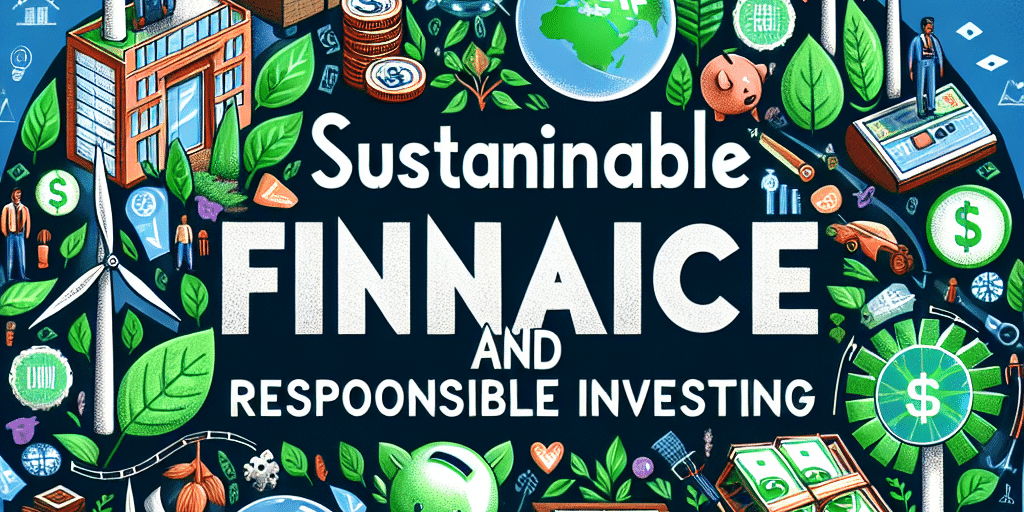Title: Navigating the Future: Sustainable Finance and Responsible Investing
In recent years, sustainable finance and responsible investing have emerged as prominent approaches in global financial markets. These concepts reflect a shift in focus from traditional investment strategies towards a paradigm that prioritizes environmental, social, and governance (ESG) factors alongside financial returns. As the world grapples with pressing issues like climate change, social inequality, and ethical governance, sustainable finance and responsible investing are paving the way for a more resilient and equitable financial system.
The Rise of Sustainable Finance
Sustainable finance refers to the integration of ESG criteria into financial services and investment decisions. It recognizes that long-term economic growth is dependent on the health of the natural environment and societal well-being. This approach aims to address the sustainability challenges by directing financial flows towards projects and companies that contribute positively to the ESG agenda.
The growth of sustainable finance can be attributed to multiple factors, including heightened awareness of climate risks, growing regulatory pressures, and changing consumer preferences. Moreover, investors are increasingly realizing that companies with strong ESG performance are better positioned to mitigate risks and capitalize on new opportunities, ultimately safeguarding their long-term value.
Corporations and financial institutions are responding to these dynamics by incorporating sustainability into their core operations. This transformation is evident in the proliferation of green bonds, social impact investing, and the integration of sustainable practices into supply chains. Governments and international organizations are also playing a crucial role by establishing frameworks and standards to guide sustainable finance practices.
Responsible Investing: Aligning Values with Financial Goals
Responsible investing goes beyond merely choosing investments based on financial factors; it involves a commitment to ethical considerations, often driven by the values and objectives of investors. This approach encompasses several strategies, including negative screening (excluding certain industries or companies), positive screening (selecting the best performers on ESG criteria), and active ownership (engaging with companies to drive positive change).
One of the most significant trends within responsible investing is the growing interest in impact investing. This involves investing in projects or companies specifically aimed at generating measurable social or environmental impacts alongside financial returns. Investors are increasingly looking to make a difference through their capital, targeting areas like renewable energy, affordable housing, and sustainable agriculture.
The shift towards responsible investing is also evident in the rise of ESG-focused funds and indices, which provide investors with opportunities to align their portfolios with their values. The availability of ESG data and analytical tools has further empowered investors to make informed decisions, enhancing transparency and comparability within the market.
Challenges and Opportunities Ahead
Despite the positive momentum, sustainable finance and responsible investing face several challenges. One of the primary concerns is the lack of standardized metrics and reporting frameworks, which can create confusion and hinder meaningful comparisons. Additionally, greenwashing—where companies or funds falsely claim to be more sustainable than they are—poses a significant risk to the integrity of the movement.
To overcome these hurdles, there is a growing call for improved disclosure standards and regulatory oversight. The development of global taxonomies and reporting guidelines, such as the EU Sustainable Finance Disclosure Regulation (SFDR), aims to bring clarity and consistency to the market, ensuring that investors can trust the sustainability claims made by companies and funds.
As the global population becomes more aware of the finite nature of resources and the need for social equity, the demand for sustainable finance and responsible investing is expected to increase. This creates opportunities for innovation, collaboration, and the development of new financial products that balance profit with purpose.
Conclusion
Sustainable finance and responsible investing represent a dynamic evolution in the financial industry, driven by the urgency of addressing global challenges. By integrating ESG considerations into decision-making processes, investors and financial institutions can contribute to a more sustainable and just world. As the movement gains traction, it is crucial for stakeholders to prioritize transparency, standardization, and accountability to ensure that the potential of sustainable finance and responsible investing is fully realized. In doing so, they not only foster positive environmental and social outcomes but also build a resilient financial system poised for future growth.







